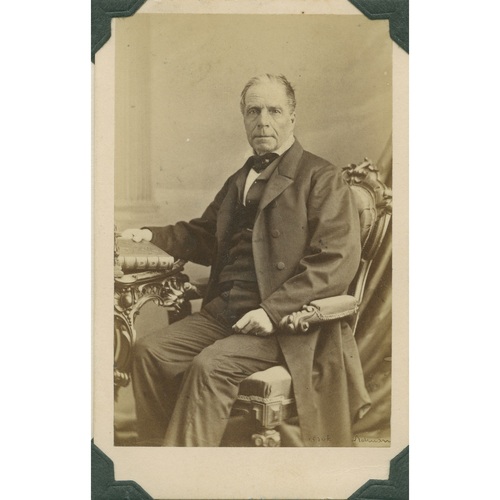![Sewell Foster
-Eastern Townships Resource Centre
-P021 – William E. Foster fonds
-Photographer: William Notman, Montreal
-Date: [circa 1860]
-Link: https://townshipsarchives.ca/dr-stephen-sewell-foster Original title: Sewell Foster
-Eastern Townships Resource Centre
-P021 – William E. Foster fonds
-Photographer: William Notman, Montreal
-Date: [circa 1860]
-Link: https://townshipsarchives.ca/dr-stephen-sewell-foster](/bioimages/w600.15359.jpg)
Source: Link
FOSTER, SEWELL (Stephen Sewell), physician, medical officer, and politician; b. 22 Nov. 1792 at Oakham, Mass., son of Samuel Foster and Patty Wilkings; d. 29 Dec. 1868 in Knowlton, Que.
On 7 Feb. 1813 young Sewell Foster married Sally Belknap of Dummerston, Vt. Two years later he was licensed by the Vermont Medical Society, and then practised in Newfane, Windham County, Vt., until 1822. In that year the Fosters and their four children joined a group of young pioneers who needed a doctor to accompany them as they followed such Newfane emigrants as the Knowltons [see Paul Holland Knowlton] and Robinsons into the Lower Canadian wilderness of the future Shefford and Brome counties. Foster settled for a year at the pioneer settlement of Frost Village in Shefford County, moved to Waterloo, in the same county, then returned to Frost Village to live on his farm.
After attending medical lectures in Quebec City and obtaining his provincial licence on 15 Feb. 1830, Foster began an extensive practice; he was one of the few doctors in the huge area from Yamaska Mountain to Missisquoi Bay, Stanstead, Sherbrooke, and Melbourne. He was appointed by Governor Dalhousie [Ramsay*] as surgeon to Colonel John Jones’ Battalion, and from 18 May 1859 until his death he served, with Dr John Brown Chamberlin, as joint coroner for the Bedford District. Dr Foster also attended lectures at McGill College’s new medical faculty and by his diligent studying and practical experience won, professional acclaim and honorary degrees from universities in England and Scotland. After the profession was organized provincially under the College of Physicians and Surgeons of Lower Canada in 1847, Foster sat as a governor until ill health forced his resignation in 1866. His widespread professional contacts notwithstanding, Foster devoted himself above all to his private practice. His kindness to his patients, his unflagging courage and energy in reaching them, whether by canoe or through uncleared forest on foot or horseback, working night after night, made him a folk hero to the people of the townships.
Foster was more than his community’s physician. He was a justice of the peace and commissioner for small causes in Shefford County, and a founder, officer, and active supporter of the Frost Village Academy. A Congregationalist in Vermont, Foster became an enthusiastic supporter of the Church of England, whose bishops, Charles James Stewart* and George Jehoshaphat Mountain, were his personal friends.
His position as a community leader and his support of the local Conservative party leader, Paul Holland Knowlton, led Foster temporarily into politics. He was defeated in the general elections of 1834 in Shefford County. When in 1841 Knowlton was appointed to the Legislative Council, Foster easily took over as member for Shefford in the Legislative Assembly, campaigning as a Unionist candidate against Alphonso Wells; in 1844 he defeated Reformer John Easton Mills. In the assembly he seldom participated in debates, and when in 1847–48 Reformer Lewis Thomas Drummond* defeated him, Foster gladly returned to medicine.
In the autumn of 1857 Foster moved from Frost Village to Knowlton. There “the old Doctor” continued his practice and his support of education, temperance, and other social reforms, until he died on 29 Dec. 1868. He left his widow, five daughters (one adopted), and seven sons including Shefford registrar Hiram Sewell, Senator Asa Belknap*, Dr William Hershall (Herschel), and Judge Samuel Willard. Among the hardy pioneers of the Eastern Townships, Sewell Foster stood out as a lion. He threw himself into his community’s social, judicial, religious, and political life, and his considerable achievements, his charismatic personality and selflessness, made him one of its outstanding pioneers.
BCHS Arch., Stephen Sewell Foster papers. Debates of the Legislative Assembly of United Canada, I–VI (the author has also consulted the ms debates for 1848). Waterloo Advertiser (Waterloo, Que.), 7 Jan. 1869. Canadian biographical dictionary, II, 266–67. F. C. Pierce, Foster genealogy; being the record of posterity of Reginald Foster, an early inhabitant of Ipswich, in New England . . . (Chicago, 1899). Cornell, Alignment of political groups, 5, 16, 24. C. M. Day, History of the Eastern Townships, province of Quebec, dominion of Canada, civil and descriptive, etc. (Montreal, 1869); Pioneers of the Eastern Townships: a work containing official and reliable information respecting the formation of settlements; with incidents in their early history; and details of adventures, perils and deliverances (Montreal, 1863). J. P. Noyes, Sketches of some early Shefford pioneers ([Montreal], 1905), 101–3. E. M. Taylor, History of Brome County, Quebec, from the date of grants of land therein to the present time; with records of some early families (2v., Montreal, 1908–37), I, 192–95.
Cite This Article
Elizabeth Gibbs, “FOSTER, SEWELL (Stephen Sewell),” in Dictionary of Canadian Biography, vol. 9, University of Toronto/Université Laval, 2003–, accessed December 31, 2025, https://www.biographi.ca/en/bio/foster_sewell_9E.html.
The citation above shows the format for footnotes and endnotes according to the Chicago manual of style (16th edition). Information to be used in other citation formats:
| Permalink: | https://www.biographi.ca/en/bio/foster_sewell_9E.html |
| Author of Article: | Elizabeth Gibbs |
| Title of Article: | FOSTER, SEWELL (Stephen Sewell) |
| Publication Name: | Dictionary of Canadian Biography, vol. 9 |
| Publisher: | University of Toronto/Université Laval |
| Year of publication: | 1976 |
| Year of revision: | 1976 |
| Access Date: | December 31, 2025 |



